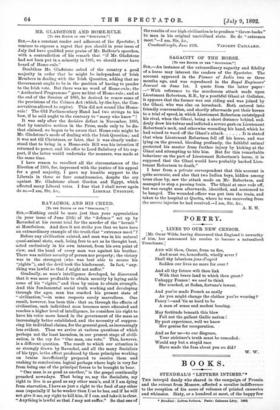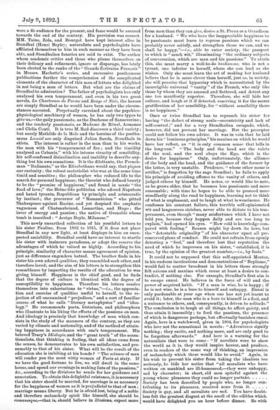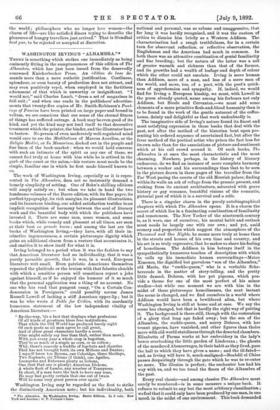BOOKS.
STENDHAL'S " LETTRES DITLIIES."41 THE intrepid dandy who shared in the campaign of Prussia and the retreat from Moscow, affected a cavalier indifference to the reception of his score of volumes of printed causeries and whimsies. Sixty, or a hundred at most, of the happy few • fitenahal : Leans Intones. Paris: 091mann Lbry. 1892'. were a fit audience for the present, and fame would be assured towards the end of the century. His prevision was correct. MM. Taine, Zola, and Bourget have kept interest alive in Stendhal (Henri Beyle); naturalists and psychologists have affiliated themselves to him in such manner as they have been able, and Stendhalian fanatics are said to exist. The author whom academic critics and those who plume themselves on their delicacy and refinement, ignore or disparage, has lately been elected to the ranks of the" Grands Ecrivains Francais" in Messrs. Hachette's series, and successive posthumous publications further the comprehension of the complicated elements of the character of this man of letters who delighted in not being a man of letters. But what are the claims of Stendhal to admiration? The father of psychologists has only analysed his own temperament; and even in his two great novels, La Chartreuse de Parme and Rouge et Nair, the heroes are simply Stendhal as he would have been under the circum- stances narrated. Perpetually exercised about the psychico- physiological machinery of women, he has only two types to give us,—the gaily passionate, as the Duchesse of Sanseverino ; and the tenderly passionate, as Madame de Renal, Armance and Clelia Conti. It is true M. Rod discovers a third variety; but surely Mathilde de la Mole and the heroine of the posthu- mous Lamiel are only disguised Julien Sorels, Stendhals in skirts. The interest is rather in the man than in his works, the man with his "temperament of fire ; and the timidity analysed as Cabanis," with his intense vivacity of sensibility, his self-confessed disinclination and inability to describe any- thing but his own sensations. It is the dilettante, the French- man " Italianate," as the Elizabethans would say, that piques our curiosity; the robust materialist who was at the same time timid and sensitive ; the philosopher who reduced life to the search for personal happiness; the theorist who defined beauty to be the "promise of happiness," and found in music "the food of love ;" the Heine-like politician who adored Napoleon and hated tyrants, Republican by principle and aristocratic by instinct ; the precursor of " Romanticism " who pitted Shakespeare against Racine, and yet despised the emphatic vagueness of Chateanbriand, Lamartine, and Hugo ; the lover of energy and passion ; the native of Grenoble whose tomb is inscribed : " Arrigo Beyle, Milanese."
This newly unearthed collection of his youthful letters to his sister Pauline, from 1802 to 1815, if it does not place Stendhal in any new light, at least displays in him an unex- pected amiability. Stendhal could have no interest to startle his sister with insincere paradoxes, or adopt the reserve the advantages of which he valued so highly. According to his principle, similarity of character means agreement of opinion, just as difference engenders hatred. The brother finds in his sister his own adored qualities; they resembled each other, and therefore loved; and the aim of his letters is to strengthen this resemblance by imparting the results of the education he was giving himself. Happiness is the chief good, and he finds that the degree of culture is identical with the degree of susceptibility to happiness. Therefore his letters resolve themselves into exhortations to " virtne,"—i.e., the apprecia- tion and exercise of qualities useful to herself, to the re- jection of all unexamined "prejudices," and a sort of familiar 3ourse of what he calls "literary metaphysics" and "ideo- logy." He recommends poets, historians, and philosophers who illustrate to his liking the effects of the passions on man. And ideology is precisely that knowledge of man which con- sists in the study of the manners of the century, as they are
varied by climate and nationality, and of the method of attain- ing happiness in accordance with one's temperament. His
beloved Tracy's Ideologie, and the "great truth" of the sensa-
tionalists, that thinking is feeling, that all ideas come from the senses, he demonstrates to his own satisfaction, and pre- sumably to that of his sister. What will be the result of the education she is imbibing at his hands ? "The science of man will render you the most witty woman of Paris at sixty. If we have the good fortune to live, we will dwell in the same house, and spend our evenings in making lists of the passions," &c., according to the divisions he sends for her guidance and annotation. To obtain this delightful existence, it is necessary that his sister should be married, for marriage is as necessary for the happiness of women as it is prejudicial to that of men ;
marriage means liberty. But he is afraid lest, being of a noble and therefore melancholy spirit like himself, she should be romanesque,—that is, should believe in illusions, expect more from men than they can give, desire a St. Preux or a Grandison for a husband. "We who have the inappreciable happiness to- be passionate must learn to repress passions which we can probably never satisfy, and strengthen those we can, and we shall be happy,"—i.e., able to enter society, the passport to which is "much wit," illuminating "the ordinary subjects of conversation, which are man and his passions." To attain this, she must marry a well-to-do banhomme, who is not a tyrant, one inferior to herself, whom she can lead as she wishes. Only she must learn the art of making her husband believe that he is more clever than herself, just as, in society, she will practise that hypocrisy which is necessitated by the incorrigible universal " vanity " of the French, who only like those by whom they are amused and flattered, and detest any one too manifestly superior. Therefore, she will hide her culture, and laugh at it if detected, reserving it for the secret gratification of her sensibility, for "without sensibility there is no happiness."
Once or twice Stendhal has to reproach his sister for having "the defect of strong souls—eccentricity and lack of self-control ;" and for a very Stendhalian escapade, which, however, did not prevent her marriage. But the preceptor could not follow his own advice. It was in vain that he laid down his" luminous principles," his maxims on which he would have her reflect, as "it is only common sense that tells in the long-run." "The body and the head are the valets of the soul, and the seal obeys the Ego, which is the desire for happiness." Only, unfortunately, the alliance of the body and the head, and the guidance of the former by the latter, is very unstable. Prudence, "whose other name is artifice," is forgotten by the sage Stendhal ; he fails to apply his principle of avoiding offence to the vanity of others, and judged others by himself. He notes, or would like to note, as he grows older, that he becomes less passionate and more reasonable ; with time he hopes to be able to proceed more steadfastly along the road to happiness, learning not to think of what is unpleasant, and to laugh at what is wearisome. He confesses his constant failure, this terrible self-opinionated wit and languorous cicisbeo, never able to dictate to his tem- perament, even though "many misfortunes which I have not told you, because they happen daily and are too long to explain," had opened his eyes. "How cold is knowledge com- pared with feeling." Reason might lay down its laws, but the "detestable originality" of his character upset all pre- conceived plans of conduct. He could not refrain from openly detesting a "fool," and therefore lost that reputation the need of which he impresses on his sister, "established, it is true, by the opinion of the greatest number,—i.e., by fools."
It could not be supposed that this self-appointed Mentor, in his undress inculcations and demonstrations of " Beylisme," would fail to scatter broadcast in his letters those strongly felt axioms and maxims which rouse at least a desire to con- tradict, if nothing else. For example, Stendhal's first aim is to escape ennui. He believes in the force of will and the power of acquired habit. "If a man is wise, he is happy ; if he is not wise, he is a bore to himself and unhappy. Ennui is only pardonable at your age when one has not yet learnt to avoid it; later, the man who is a bore to himself is a fool, and a nuisance to others, and, consequently, is driven to solitude." The conclusion is to laugh at all things, to affect gaiety, and thus attain it insensibly ; to feed the passions, the presence of which is dangerous perhaps, but effectually banishes ennui. Again, here is a watchword, given in 1804, for psychologists who love not the sensational in novels : "Adventures signify nothing ; they excite, and nothing more, and are only good to be forgotten afterwards." And here is a warning for the
• naturalists that were to come : "If novelists were to show the world as it is, they would inspire horror, and produce, even in readers of the same way of thinking, an impression of melancholy which these would like to avoid." Again, in his wish to prevent his sister from taking the idealists toe seriously, he bids her notice that "all moralists who have
written on mankind are ill-humoured,--they were unhappy, sad by character; in short, old men spiteful against the
young whose pleasures they could no longer partake Society has been described by people who, no longer con- tributing to its pleasures, received none from it Society is gay, and all moralists are sad. You have doubt- less felt the greatest disgust at the smell of the edibles which would have delighted you an hour before dinner. So with
the world.; philosophers who no longer love women—the charm of life—are like satisfied diners trying to describe the pleasures of hungry travellers just arrived." That is Stendhal tout pur, to be rejected or accepted at discretion.




















































 Previous page
Previous page